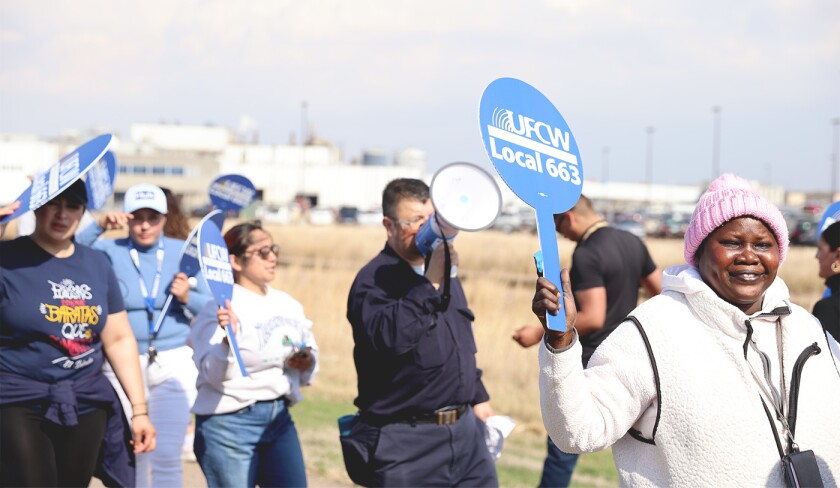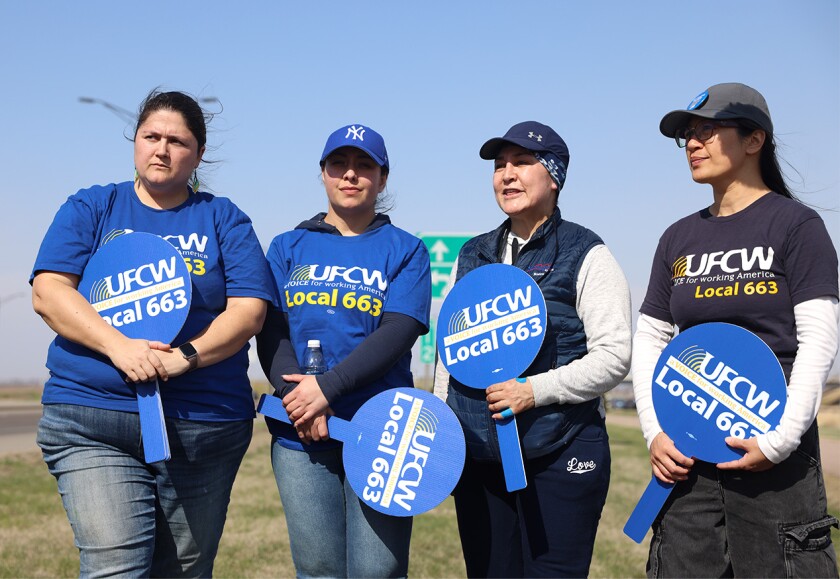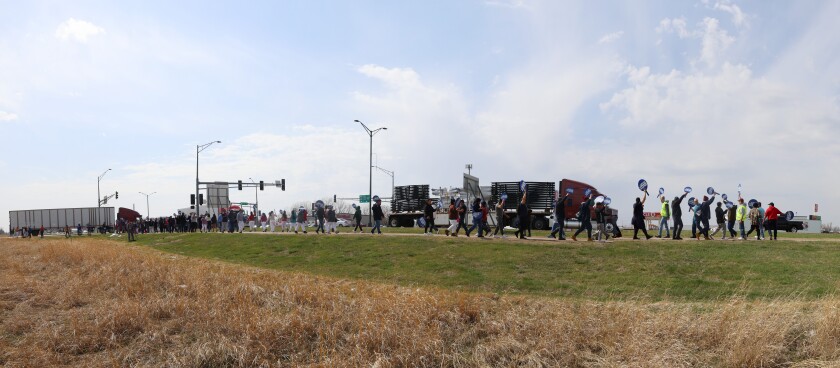WORTHINGTON — The JBS Code of Conduct and Ethics states that JBS is committed to providing a safe work environment, yet their employees marched Thursday evening to request more health and safety protections.
The workers could be heard chanting “We want more!”

Many workers at JBS are members of the United Food and Commercial Workers International Union, which holds employers accountable for safer workplaces.
Rena Wong, president of UFCW Local 663, said the JBS workers were out marching to be able to secure a contract that allows for a safer workplace and higher wages.
“We need JBS and the community to know that safe line speeds and safety standards in this plant are super important,” she said.
The union has been in negotiations with JBS for several months. According to Wong, every time they are at the table talking about how the workers need better safety and need better enforcement of line speeds, JBS rejects all of their bargaining committee proposals.
“It’s just ridiculous,” Wong said. “People should be able to leave work with their body intact and safe, in the same way that they showed up to work in the morning.”
Earlier this year, under the Biden administration, the USDA released a pair of studies that found 81% of poultry processing workers and 46% of pork processing workers were at high risk for musculoskeletal disorders from the fast, repetitive movements of chopping up carcasses hour after hour.
Diana Rodriguez has been working on the ham line at JBS for almost two years now.
ADVERTISEMENT

“We are here talking about the injuries that we get working at JBS,” she said. “In my personal case, I was working on the ham line when my hand began to hurt. I told my supervisor about my pain and that I wanted to go to the nurse.”
Her supervisor asked her why her hand was hurting when everyone else was working fine. He continued to ask her how she was handling the ham.
Rodriguez said she has to pick up the piece of ham with her left hand in order to get it in the correct position for her to use the whizard power knife with her right hand.
“I showed him my hand and said ‘Look at my hand, it is swollen,’” she said. “He said ‘No, you go back to your spot on the line.’”
On her own break time, Rodriguez went to the nurses office because her hand hurt too much. While she was there, the nurses had asked how her hand got to be so swollen.
“Well, I reported it with my supervisor and he told me to go back to work,” she said.
She was given a work change and started some therapies for her hand, but in the next few days, her supervisors came to talk to her. They told her that her injuries were her fault and that she was overworking herself.
ADVERTISEMENT
“That really felt like a psychological game they were playing with me,” Rodriguez said.
They did put her in a different position but it wasn’t necessarily a job assignment that allowed her to rest her hands.
“My hand continued to hurt,” she said. “With these repetitive motion injuries, I felt the pain in my hand, but I felt it travel up my arm and all the way into my back. What I felt then and what I still feel now is that our supervisors need to listen when workers bring up pain, because if they don’t and we continue working, we are going to get even more and more hurt.”
Last month, the Trump administration moved to streamline U.S. pork and poultry processing by increasing line speeds.
“Under President Trump’s leadership, we are cutting unnecessary red tape, empowering businesses to operate more efficiently, and strengthening American agriculture –all while upholding the highest food safety standards,” said USDA Secretary Brooke Rollins in her press release on March 17.
Yet the action was publicly denounced by labor and food safety groups for the potential risks it presents to food safety and worker health.
The UFCW has championed the Protecting America’s Meatpacking Workers Act, which restricts the USDA’s ability to issue line speed waivers.
ADVERTISEMENT
“What I know is that JBS has not applied for a line speed waiver up to this point,” Ruth Schultz, the meat packing director for UFCW Local 663, said. “We have asked them to inform us if they do apply for a line speed waiver. We haven’t heard that they have.”
She explained that the line speed waiver is for the evisceration rate on the kill section and that there are other lines, such as the ham or cut line, that can be sped up or sped down without being governed by the USDA.
“We often feel that the line speeds are running very high,” Rodriguez said. “We report that to our union stewards to try and get it back under control. If we tell our supervisors, they won’t do anything about it.”
She shared how it makes her feel horrible as it is the workers who are on the lines and getting injured, not the supervisors.
“If JBS decided to speed up the line speeds, really one of the risks is that there’s not going to be quality products coming out,” she said. “Also, as a consequence, more injuries to the workers.”
Rodriguez said it is a very common experience for workers to be in pain while working.
“If you saw us on our breaks, you’d see us massaging our hands and exercising our wrists, trying to make that pain go away and make our hands feel better for when we have to go back,” she said. “I’ve also heard comments from coworkers that they don’t want to go to the nurses station in JBS for the same reason that I experienced. They might not let you go or they’ll scold you for going.”
ADVERTISEMENT
Schultz, who joined the union at the beginning of this year, said they have made proposals to address further training and further ability to monitor and report the line speeds.
“Those are proposals we’re making in our contract negotiations right now,” she said. “So far, they have not wanted to agree to additional people being able to have that authority.”
JBS workers were not only marching for health and safety, but for higher wages as well.

“We need folks to be paid family sustaining wages so that they want to stay here,” Wong said.
Lorena Zavala has worked on the cut floor for five years. She is a single mother with two kids.
One day, she sat herself down to tally up all of her bills to compare it with how much she makes at JBS. She discovered that she doesn’t make enough money at JBS to pay her bills, so she had to find a second job.
“I work so that I can give them (her kids) economically all of the things that they need,” Zavala said. “But that time that I’m losing away from them, I’m never going to be able to recuperate. That’s why I’m here together with all of my coworkers because we want a raise that is just, because without us, there is no JBS.”
ADVERTISEMENT
This march was the first to happen outside the Worthington JBS plant in over a decade.
“It was the most workers who have come together to take action about workplace issues with their union,” Schultz said. “We are hopeful that all the workers and JBS see that this is an issue that many workers care deeply about.”












